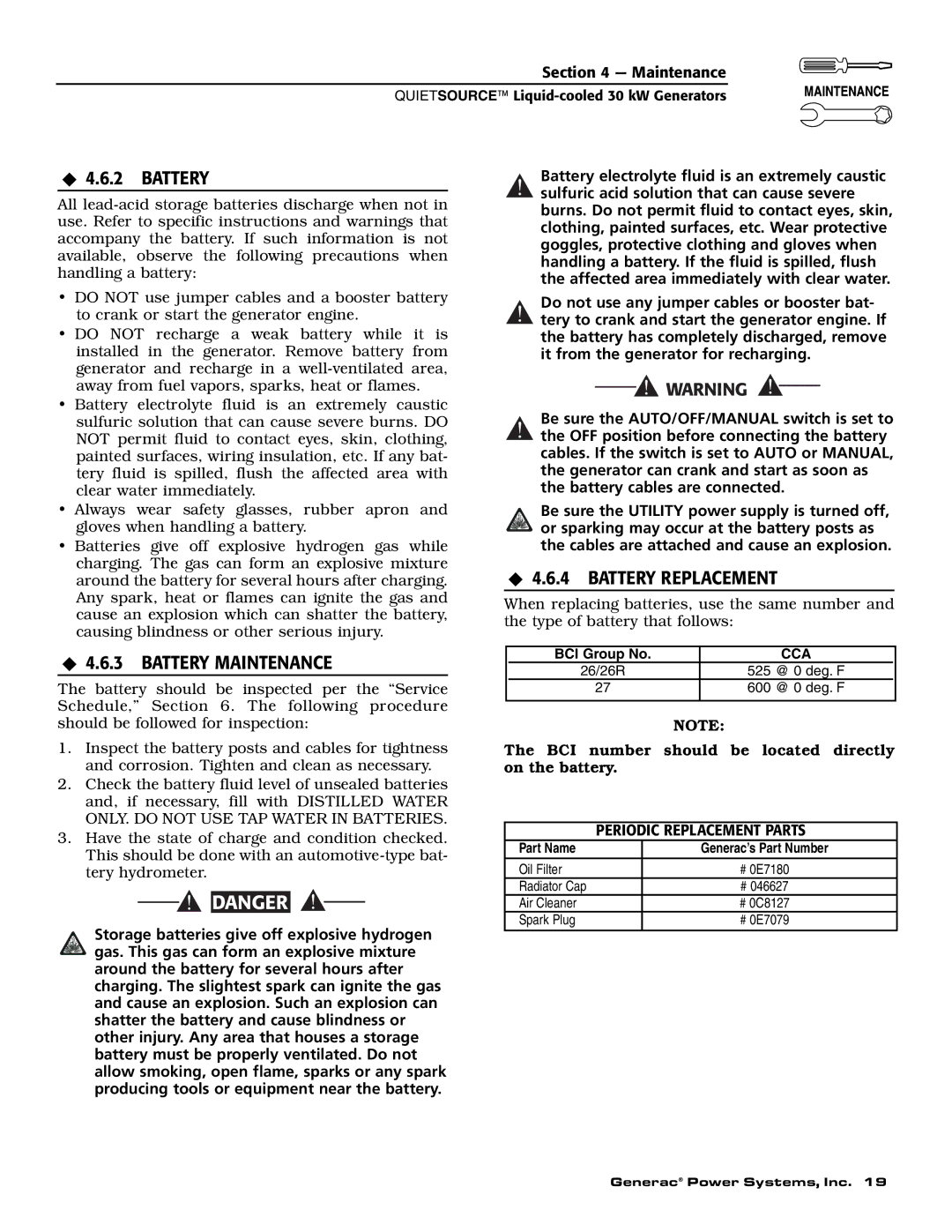
Section 4 — Maintenance
QUIETSOURCE™
4.6.2 BATTERY
All
•DO NOT use jumper cables and a booster battery to crank or start the generator engine.
•DO NOT recharge a weak battery while it is installed in the generator. Remove battery from generator and recharge in a
•Battery electrolyte fluid is an extremely caustic sulfuric solution that can cause severe burns. DO NOT permit fluid to contact eyes, skin, clothing, painted surfaces, wiring insulation, etc. If any bat- tery fluid is spilled, flush the affected area with clear water immediately.
•Always wear safety glasses, rubber apron and gloves when handling a battery.
•Batteries give off explosive hydrogen gas while charging. The gas can form an explosive mixture around the battery for several hours after charging. Any spark, heat or flames can ignite the gas and cause an explosion which can shatter the battery, causing blindness or other serious injury.
4.6.3 BATTERY MAINTENANCE
The battery should be inspected per the “Service Schedule,” Section 6. The following procedure should be followed for inspection:
1.Inspect the battery posts and cables for tightness and corrosion. Tighten and clean as necessary.
2.Check the battery fluid level of unsealed batteries and, if necessary, fill with DISTILLED WATER ONLY. DO NOT USE TAP WATER IN BATTERIES.
3.Have the state of charge and condition checked. This should be done with an
![]()
![]() DANGER
DANGER
Storage batteries give off explosive hydrogen gas. This gas can form an explosive mixture around the battery for several hours after charging. The slightest spark can ignite the gas and cause an explosion. Such an explosion can shatter the battery and cause blindness or other injury. Any area that houses a storage battery must be properly ventilated. Do not allow smoking, open flame, sparks or any spark producing tools or equipment near the battery.
Battery electrolyte fluid is an extremely caustic ! sulfuric acid solution that can cause severe
burns. Do not permit fluid to contact eyes, skin, clothing, painted surfaces, etc. Wear protective goggles, protective clothing and gloves when handling a battery. If the fluid is spilled, flush the affected area immediately with clear water.
Do not use any jumper cables or booster bat- ! tery to crank and start the generator engine. If
the battery has completely discharged, remove it from the generator for recharging.
Be sure the AUTO/OFF/MANUAL switch is set to ! the OFF position before connecting the battery cables. If the switch is set to AUTO or MANUAL,
the generator can crank and start as soon as the battery cables are connected.
Be sure the UTILITY power supply is turned off, or sparking may occur at the battery posts as the cables are attached and cause an explosion.
4.6.4 BATTERY REPLACEMENT
When replacing batteries, use the same number and the type of battery that follows:
| BCI Group No. | CCA |
|
| 26/26R | 525 @ 0 deg. F |
|
| 27 | 600 @ 0 deg. F |
|
|
|
|
|
|
| NOTE: |
The BCI number | should be located directly | |
on the battery. |
| |
|
| |
PERIODIC REPLACEMENT PARTS | ||
Part Name |
| Generac’s Part Number |
Oil Filter |
| # 0E7180 |
Radiator Cap |
| # 046627 |
Air Cleaner |
| # 0C8127 |
Spark Plug |
| # 0E7079 |
Generac® Power Systems, Inc. 19
